Office hours have been established to aid students and department personnel in navigating the nominating procedures for FLAS. Beginning Thursday, November 14, hours will be available between 10:30 a.m. and 11:30 a.m. Tuesdays and Thursdays. Walk-ins are welcome; appointments are encouraged. Please email Jodi Elowitz at elow0001@umn.edu to set up an appointment. Hours will take place in room 248 Social Sciences Building.
2014-2015 Fellowship in European and International Studies, Foreign Language and Area Studies (FLAS) competition is open to undergraduate, graduate and professional students to promote the study of modern foreign languages and in particular less-commonly-taught languages in European and International studies.
Summer Fellowships provide a $2500 living stipend and $5000 towards tuitions and fees for undergrads, graduate and professional students. Academic Year Fellowships provide undergraduates with a $5000 living stipend and $10,000 towards tuition and fees. A $15,000 living stipend and $18,000 towards tuition and fees is available for graduate and professional students.
Eligibility, information and complete details for both international and European competitions are available online by clicking here.
A new online procedure for handling nominations is being put into place and will be announced soon. 2014-2015 Academic Year FLAS awards will be contingent on available funding from the U.S. Department of Education.
Monday, November 11, 2013
Monday, November 4, 2013
Finalists for director at Center for Austrian Studies to present
Three finalists for the position of permanent director for the Center for Austrian Studies will be making presentations on the University of Minnesota campus in November.
Howard Louthan, history, University of Florida. "Erasmus, Poland, and the Reformation." Thursday, November 7, 1:30-3:00 p.m., 1210 Heller Hall. "A Vision for the Future of CAS," Friday, November 8, 12:00-1:15 p.m., 614 Social Sciences Building.
Daniel Unowsky, history, University of Memphis. "Local Violence and State Crisis: The 1898 Anti-Jewish Riots in Habsburg Galicia." Tuesday, November 19, 3:30-5:00 p.m., 1210 Heller Hall. "A Vision for the Future of CAS," Wednesday, November 20, 12:00-1:15 p.m., 614 Social Sciences Building.
Egbert Klautke, cultural history, School of Slavonic and East European Studies, University College, London. "A Vision for the Future of CAS," Thursday, November 21, 12:00-1:15 p.m., 614 Social Sciences Building. for "The Descent of Freud: On the Reception and Popularization of Freudianism in Europe and America, c. 1930-1990." Friday, November 22, 2:00-3:30, 1210 Heller Hall.
Howard Louthan, history, University of Florida. "Erasmus, Poland, and the Reformation." Thursday, November 7, 1:30-3:00 p.m., 1210 Heller Hall. "A Vision for the Future of CAS," Friday, November 8, 12:00-1:15 p.m., 614 Social Sciences Building.
Daniel Unowsky, history, University of Memphis. "Local Violence and State Crisis: The 1898 Anti-Jewish Riots in Habsburg Galicia." Tuesday, November 19, 3:30-5:00 p.m., 1210 Heller Hall. "A Vision for the Future of CAS," Wednesday, November 20, 12:00-1:15 p.m., 614 Social Sciences Building.
Egbert Klautke, cultural history, School of Slavonic and East European Studies, University College, London. "A Vision for the Future of CAS," Thursday, November 21, 12:00-1:15 p.m., 614 Social Sciences Building. for "The Descent of Freud: On the Reception and Popularization of Freudianism in Europe and America, c. 1930-1990." Friday, November 22, 2:00-3:30, 1210 Heller Hall.
Labels:
"Austrian Studies",
Home
Monday, October 7, 2013
The Book that Changed Europe
Picart and Bernard's Religious Ceremonies of the World, with author Wijnand Mijnhardt
Center for Early Modern History Book Discussion
Friday, October 18
12:15 p.m.
James Ford Bell Library Wilson Library

Wijnand Mijnhardt, of the Descartes Centre for the History and Philosophy of the Sciences and Humanities at Utrecht University, will lead a discussion of his book The Book that Changed Europe: Picart and Bernard's Religious Ceremonies of the World.
This event is co-sponsored by the Center for Early Modern History, the James Ford Bell Library, the Program in the History of Science, Technology, and Medicine, and the European Studies Consortium.
Center for Early Modern History Book Discussion
Friday, October 18
12:15 p.m.
James Ford Bell Library Wilson Library

Wijnand Mijnhardt, of the Descartes Centre for the History and Philosophy of the Sciences and Humanities at Utrecht University, will lead a discussion of his book The Book that Changed Europe: Picart and Bernard's Religious Ceremonies of the World.
This event is co-sponsored by the Center for Early Modern History, the James Ford Bell Library, the Program in the History of Science, Technology, and Medicine, and the European Studies Consortium.
Muddle in the Med: the euro crisis and beyond
Friday, October 18
9:00 a.m.
100 Murphy Hall
Free and open to the public, to reserve a space please click here.
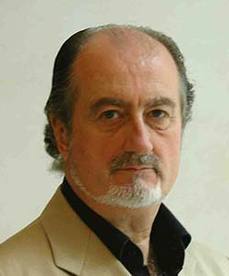
John Hooper, the Southern Europe Editor of the Guardian and Italy Correspondent of the Economist, asks whether the euro crisis is really over -- and looks at some of the other issues arising in what Europeans till recently thought of as their playground.
This event will be hosted by Giovanna Dell'Orto, assistant professor at the University of Minnesota School of Journalism & Mass Communication. On September 26, 2013 her new book Reporting at the Southern Borders: Journalism and Public Debates on Immigration in the U.S. and the E.U. will be published and includes a chapter written by Hooper.
This event is co-sponsored by the European Studies Consortium and the Department of Spanish/Portuguese.
9:00 a.m.
100 Murphy Hall
Free and open to the public, to reserve a space please click here.

John Hooper, the Southern Europe Editor of the Guardian and Italy Correspondent of the Economist, asks whether the euro crisis is really over -- and looks at some of the other issues arising in what Europeans till recently thought of as their playground.
This event will be hosted by Giovanna Dell'Orto, assistant professor at the University of Minnesota School of Journalism & Mass Communication. On September 26, 2013 her new book Reporting at the Southern Borders: Journalism and Public Debates on Immigration in the U.S. and the E.U. will be published and includes a chapter written by Hooper.
This event is co-sponsored by the European Studies Consortium and the Department of Spanish/Portuguese.
Labels:
"Euro Crisis",
"European Studies",
Home
Wednesday, August 14, 2013
Special Screening of The Sami
The Sami
Thursday, August 29
6:00 PM - 8:00 PM
All My Relations Art Gallery
1414 East Franklin Avenue Minneapolis, MN 55404
This event is free and open to the public.
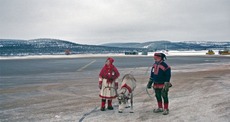
Being Sami no longer means making a living by herding reindeer in the far northern reaches of Norway, Sweden, Finland and Russia. In a Finnish documentary, The Sami (Sapmelas) many Sami who have followed work to the big cities of northern Europe reflect on changes they have experienced within their lifetimes, as they have become musicians, store clerks, a film director, a school kid, an artist, a young mother, and, as a counterpoint, a couple engaged in traditional reindeer-herding.
Co-directors Anastasia Lapsui (a radio journalist in Salekhard, and part of a Nenets language program) and Markku Lehmuskallio (Seven Songs from the Tundra, 1999, Mothers of Life, 2001, and A Bride of the Seventh Heaven, 2004) explore the Sami diaspora, ask if the change of life-style and surroundings has transformed the uniquely Sami way of looking at the world. Sami speak candidly of what "being Sami" means to them, in ways that show the adaptiveness of tradition despite the hardships
The film will be screened in Sami, Finnish and Swedish with English subtitles.
After the film we will have discussion and Q&A with two leading Sami scholars from Finland. Professor Veli-Pekka Lehtola (University of Oulu) has authored 12 books and about 70 scientific articles on the history of the Sami and Lapland and on contemporary Sami art. Dr. Irja Seurujärvi-Kari is a lecturer and the director of multidisciplinary Sami studies program at the University of Helsinki. In addition to her academic career, Seurujärvi-Kari has been a member of the Sami Parliament.
Sponsored by: The Institute for Global Studies, All My Relations Art Gallery, The American Swedish Institute, Government of Finland/David and Nancy Speer Visiting Professorship in Finnish Studies, European Studies Consortium
Thursday, August 29
6:00 PM - 8:00 PM
All My Relations Art Gallery
1414 East Franklin Avenue Minneapolis, MN 55404
This event is free and open to the public.

Being Sami no longer means making a living by herding reindeer in the far northern reaches of Norway, Sweden, Finland and Russia. In a Finnish documentary, The Sami (Sapmelas) many Sami who have followed work to the big cities of northern Europe reflect on changes they have experienced within their lifetimes, as they have become musicians, store clerks, a film director, a school kid, an artist, a young mother, and, as a counterpoint, a couple engaged in traditional reindeer-herding.
Co-directors Anastasia Lapsui (a radio journalist in Salekhard, and part of a Nenets language program) and Markku Lehmuskallio (Seven Songs from the Tundra, 1999, Mothers of Life, 2001, and A Bride of the Seventh Heaven, 2004) explore the Sami diaspora, ask if the change of life-style and surroundings has transformed the uniquely Sami way of looking at the world. Sami speak candidly of what "being Sami" means to them, in ways that show the adaptiveness of tradition despite the hardships
The film will be screened in Sami, Finnish and Swedish with English subtitles.
After the film we will have discussion and Q&A with two leading Sami scholars from Finland. Professor Veli-Pekka Lehtola (University of Oulu) has authored 12 books and about 70 scientific articles on the history of the Sami and Lapland and on contemporary Sami art. Dr. Irja Seurujärvi-Kari is a lecturer and the director of multidisciplinary Sami studies program at the University of Helsinki. In addition to her academic career, Seurujärvi-Kari has been a member of the Sami Parliament.
Sponsored by: The Institute for Global Studies, All My Relations Art Gallery, The American Swedish Institute, Government of Finland/David and Nancy Speer Visiting Professorship in Finnish Studies, European Studies Consortium
Wednesday, July 31, 2013
Workshop and Lectures with Jacques Rancière
Click here for full schedule.
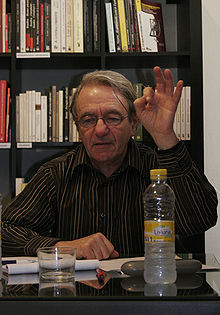
Philosopher Jacques Rancière is among the preeminent contemporary thinkers of the intersection between politics and aesthetics, including questions of social history, political participation, education, cinema, literature, modernity and human rights. Among his latest of more than fifteen books to be translated into English are Aisthesis: Scenes from the Aesthetic Regime of Art (Verso, 2013), and Béla Tarr: The Time After (Univocal, 2013). His books also include The Future of the Image (Verso, 2007) and Film Fables (Berg, 2006).

Philosopher Jacques Rancière is among the preeminent contemporary thinkers of the intersection between politics and aesthetics, including questions of social history, political participation, education, cinema, literature, modernity and human rights. Among his latest of more than fifteen books to be translated into English are Aisthesis: Scenes from the Aesthetic Regime of Art (Verso, 2013), and Béla Tarr: The Time After (Univocal, 2013). His books also include The Future of the Image (Verso, 2007) and Film Fables (Berg, 2006).
Labels:
Cinema,
Home,
Literature,
Phillosophy
The Discovery of the "New World" and Traditions of Othering
A lecture by Pedro Martínez García
September 20, 2013
Room 1210 Heller Hall
12:15 p.m.
The arrival of the Castilian caravels in 1492 on the coast and islands which at first sight were identified as the Orient and the resulting encounters with the first natives oddly coincides with the end of the so called "coexistence of the three cultures" in the kingdoms of the Iberian Peninsula. Contemporary Christian Castilians set aside their Jewish and their Morisco others to engage with "new others" in unchartered territories, where concepts like conversion, conquista and cohabitation evolved and were adapted to new contexts. This moment is often considered a symbolic turning point between the Middle Ages and Modernity.
In his talk, Dr. Martinez will focus on the traditions of othering in the early modern Iberian Atlantic World, paying special attention to the European perceptions of the natives of the "New World" through chronicles and travel narratives.
Pedro Martínez García is a lecturer in the Chair of Early modern History, University of Bayreuth, Germany.
Since 2008, he has been writing his dissertation entitled "Face to Face with the Other: Travel Narratives and Alterity from the Late Middle Ages to the Early Modern Period"
at the University of Valladolid (Spain) and the University of Bayreuth (Germany).
Sponsored by: Center for Holocaust and Genocides Studies, Center for Early Modern History, Department of Spanish and Portuguese, European Studies Consortium.
September 20, 2013
Room 1210 Heller Hall
12:15 p.m.
The arrival of the Castilian caravels in 1492 on the coast and islands which at first sight were identified as the Orient and the resulting encounters with the first natives oddly coincides with the end of the so called "coexistence of the three cultures" in the kingdoms of the Iberian Peninsula. Contemporary Christian Castilians set aside their Jewish and their Morisco others to engage with "new others" in unchartered territories, where concepts like conversion, conquista and cohabitation evolved and were adapted to new contexts. This moment is often considered a symbolic turning point between the Middle Ages and Modernity.
In his talk, Dr. Martinez will focus on the traditions of othering in the early modern Iberian Atlantic World, paying special attention to the European perceptions of the natives of the "New World" through chronicles and travel narratives.
Pedro Martínez García is a lecturer in the Chair of Early modern History, University of Bayreuth, Germany.
Since 2008, he has been writing his dissertation entitled "Face to Face with the Other: Travel Narratives and Alterity from the Late Middle Ages to the Early Modern Period"
at the University of Valladolid (Spain) and the University of Bayreuth (Germany).
Sponsored by: Center for Holocaust and Genocides Studies, Center for Early Modern History, Department of Spanish and Portuguese, European Studies Consortium.
Labels:
"New World",
Home,
Iberians,
Other
Barbara Fuchs: "Genre and Empire in the Mediterranean"
CEMH Work-in-Progress Seminar
Friday, September 13
12:15 p.m.
East Bank (TBD)
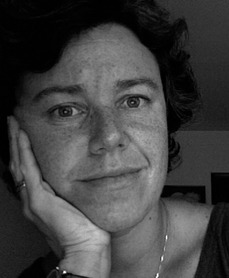
Barbara Fuchs, of the Department of Spanish and Portuguese and the Department of English at UCLA, will share her work "Genre and Empire in the Mediterranean" in a Center for Early Modern History work-in-progress seminar. A copy of the paper for this seminar will circulate in advance and will be available from the Center for Early Modern History website.
Sponsored by: Center for Early Modern History, European Studies Consortium, Department of English, Department of Spanish and Portuguese.
Friday, September 13
12:15 p.m.
East Bank (TBD)

Barbara Fuchs, of the Department of Spanish and Portuguese and the Department of English at UCLA, will share her work "Genre and Empire in the Mediterranean" in a Center for Early Modern History work-in-progress seminar. A copy of the paper for this seminar will circulate in advance and will be available from the Center for Early Modern History website.
Sponsored by: Center for Early Modern History, European Studies Consortium, Department of English, Department of Spanish and Portuguese.
Labels:
Empire,
Genre,
Home,
Mediterranean
Tuesday, April 23, 2013
FLAS Award Winners Announced
The Institute for Global Studies and The European Studies Consortium would like to congratulate the Foreign Language and Area Studies (FLAS) awardees for Summer 2013 and the upcoming Academic Year 2014.
Western Europe Summer 2013
Madeline Reibe, Undergraduate, Intermediate Italian, Department of French and Italian
Kristen Stoeckler, PhD, Beginning Turkish, Theater
Amanda Taylor, PhD, Intermediate Italian, English
J. Adelia Chrysler, PhD, Beginning Yiddish, Department of German, Scandinavian & Dutch
Rachel Schaff, PhD, Beginning Czech, Cultural Studies & Comparative Literature
Western Europe Academic Year 2013-2014
John Stanoch, Undergraduate, Intermediate Russian, Linguistics & Russian
Timothy Bell, Undergraduate, Intermediate Italian, Physiology/French and Italian Studies
Jean Costello, Undergraduate, Intermediate Russian, Mathematics
Felicia Stevens, Undergraduate, Intermediate Dutch, Theater Arts & Dance
Paul Vig, PhD, Intermediate Dutch, Department of History
Andrew Hoyt, PhD, Intermediate Italian, Department of History
Margarita Kopelmahker, PhD, Advanced Russian, Theater Arts & Dance
Lucas Franco, PhD, Intermediate Norwegian, Political Science
International Summer 2013
Emily Walz, Undergraduate, Advanced Chinese. Department of Asian Languages and Literature
Alexandra Mitchell, Undergraduate, Intermediate Arabic, Institute for Global Studies
Julia Corwin, Graduate, Intermediate Hindi, Geography
Katie Lambright, PhD, Intermediate Chinese, History
International Academic Year 2013-2014
Gabrielle Abeles-Allison, Undergraduate, Intermediate Arabic, Food Science and Nutrition
Jennifer Cafarella, Undergraduate, Advanced Arabic, Institute for Global Studies
Pashouably Vang, Undergraduate, Intermediate Chinese, Asian Languages and Literature
Na Hee Lee-Workman, Undergraduate, intermediate Portuguese, Spanish & Portuguese
Jenna Marie Rasmusson, Graduate, Advanced Swahili, School of Public Health
Julia Corwin, Graduate,Intermediate Hindi, Geography
Terran Chambers, JD, Beginning Arabic, Law School
The FLAS competition is open to undergraduate, graduate and professional students to promote the study of modern foreign languages and in particular less-commonly-taught languages in European and International studies.
Summer Fellowships provide $2500 living stipend and $5000 towards tuitions and fees for undergrads, graduate and professional students. Academic Fellowships provide undergraduates with a $5000 living stipend and $10,000 towards tuition and fees. A $15,000 living stipend and $18,000 towards tuition and fees is available for graduate and professional students.
The nomination process for Summer 2014 and AY 2015 will begin in the fall of 2013. Look for information on the IGS and ESC website in August.
Western Europe Summer 2013
Madeline Reibe, Undergraduate, Intermediate Italian, Department of French and Italian
Kristen Stoeckler, PhD, Beginning Turkish, Theater
Amanda Taylor, PhD, Intermediate Italian, English
J. Adelia Chrysler, PhD, Beginning Yiddish, Department of German, Scandinavian & Dutch
Rachel Schaff, PhD, Beginning Czech, Cultural Studies & Comparative Literature
Western Europe Academic Year 2013-2014
John Stanoch, Undergraduate, Intermediate Russian, Linguistics & Russian
Timothy Bell, Undergraduate, Intermediate Italian, Physiology/French and Italian Studies
Jean Costello, Undergraduate, Intermediate Russian, Mathematics
Felicia Stevens, Undergraduate, Intermediate Dutch, Theater Arts & Dance
Paul Vig, PhD, Intermediate Dutch, Department of History
Andrew Hoyt, PhD, Intermediate Italian, Department of History
Margarita Kopelmahker, PhD, Advanced Russian, Theater Arts & Dance
Lucas Franco, PhD, Intermediate Norwegian, Political Science
International Summer 2013
Emily Walz, Undergraduate, Advanced Chinese. Department of Asian Languages and Literature
Alexandra Mitchell, Undergraduate, Intermediate Arabic, Institute for Global Studies
Julia Corwin, Graduate, Intermediate Hindi, Geography
Katie Lambright, PhD, Intermediate Chinese, History
International Academic Year 2013-2014
Gabrielle Abeles-Allison, Undergraduate, Intermediate Arabic, Food Science and Nutrition
Jennifer Cafarella, Undergraduate, Advanced Arabic, Institute for Global Studies
Pashouably Vang, Undergraduate, Intermediate Chinese, Asian Languages and Literature
Na Hee Lee-Workman, Undergraduate, intermediate Portuguese, Spanish & Portuguese
Jenna Marie Rasmusson, Graduate, Advanced Swahili, School of Public Health
Julia Corwin, Graduate,Intermediate Hindi, Geography
Terran Chambers, JD, Beginning Arabic, Law School
The FLAS competition is open to undergraduate, graduate and professional students to promote the study of modern foreign languages and in particular less-commonly-taught languages in European and International studies.
Summer Fellowships provide $2500 living stipend and $5000 towards tuitions and fees for undergrads, graduate and professional students. Academic Fellowships provide undergraduates with a $5000 living stipend and $10,000 towards tuition and fees. A $15,000 living stipend and $18,000 towards tuition and fees is available for graduate and professional students.
The nomination process for Summer 2014 and AY 2015 will begin in the fall of 2013. Look for information on the IGS and ESC website in August.
Labels:
"Western Europe",
FLAS,
Foreign,
Home,
International,
Language
Monday, April 15, 2013
Schedule now availaible for Burning the Sea
Friday and Saturday, April 19-20, 2013
Nolte Center
Free and open to the public. Reservations available online until Wednesday, April 17 by clicking here.
Program schedule available for download by clicking the link below:
BTSfinal.pdf

"Burning the Sea: Clandestine Migrations in the Age of Globalization" is a symposium designed as an interdisciplinary conference that will bring together fifteen scholars from various national and international institutions, with a wide range of disciplines in the humanities and social sciences. Panelists will discuss contemporary clandestine human migratory flows across the Mediterranean Sea between southwestern Europe and North- and Sub-Saharan Africa, as they are represented in French, Francophone, and Spanish literature and cinema. Panels will also examine these migratory patterns, concentrating on how they are accounted throughout history, in mass media, and political discourse.
Convened by Hakim Abderrezak, Department of French and Italian, University of Minnesota
Participating Scholars:
Silvia Bermúdez, University of California-Santa Barbara
Sabrina Brancato, University of Bayreuth
Carla Calargé, Florida Atlantic University
Sylvie Durmelat, Georgetown University
Claudia Esposito, University of Massachusetts-Boston
Anouar Majid,University of New England
Brinda Mehta, Mills College
Valerie Orlando,University of Maryland-College Park
Gema Pérez-Sánchez, University of Miami
Liliana Suárez-Navaz, Universidad Autónoma de Madrid
Edwige Tamalet Talbayev, Yale University
Plenary Address:
Dominic Thomas, UCLA
Panel Chairs:
Shaden Tageldin, Department of Cultural Studies & Comparative Literature, University of Minnesota
Ofelia Ferran, Department of Spanish & Portuguese Studies, University of Minnesota
Nabil Matar, Department of English, University of Minnesota
William Viestenz , Department of Spanish & Portuguese Studies, University of Minnesota
Sponsored by: University of Minnesota Imagine Fund Special Events Programs,
European Studies Consortium, Institute for Global Studies, College of Liberal Arts, Immigration History Research Center, Interdisciplinary Center for the Study of Global Change, Department of French and Italian, Institute for Advanced Studies, Department of Spanish and Portuguese Studies, Department of History, Humphrey School of Public Affairs, Department of English, Department of Anthropology.
Nolte Center
Free and open to the public. Reservations available online until Wednesday, April 17 by clicking here.
Program schedule available for download by clicking the link below:
BTSfinal.pdf

"Burning the Sea: Clandestine Migrations in the Age of Globalization" is a symposium designed as an interdisciplinary conference that will bring together fifteen scholars from various national and international institutions, with a wide range of disciplines in the humanities and social sciences. Panelists will discuss contemporary clandestine human migratory flows across the Mediterranean Sea between southwestern Europe and North- and Sub-Saharan Africa, as they are represented in French, Francophone, and Spanish literature and cinema. Panels will also examine these migratory patterns, concentrating on how they are accounted throughout history, in mass media, and political discourse.
Convened by Hakim Abderrezak, Department of French and Italian, University of Minnesota
Participating Scholars:
Silvia Bermúdez, University of California-Santa Barbara
Sabrina Brancato, University of Bayreuth
Carla Calargé, Florida Atlantic University
Sylvie Durmelat, Georgetown University
Claudia Esposito, University of Massachusetts-Boston
Anouar Majid,University of New England
Brinda Mehta, Mills College
Valerie Orlando,University of Maryland-College Park
Gema Pérez-Sánchez, University of Miami
Liliana Suárez-Navaz, Universidad Autónoma de Madrid
Edwige Tamalet Talbayev, Yale University
Plenary Address:
Dominic Thomas, UCLA
Panel Chairs:
Shaden Tageldin, Department of Cultural Studies & Comparative Literature, University of Minnesota
Ofelia Ferran, Department of Spanish & Portuguese Studies, University of Minnesota
Nabil Matar, Department of English, University of Minnesota
William Viestenz , Department of Spanish & Portuguese Studies, University of Minnesota
Sponsored by: University of Minnesota Imagine Fund Special Events Programs,
European Studies Consortium, Institute for Global Studies, College of Liberal Arts, Immigration History Research Center, Interdisciplinary Center for the Study of Global Change, Department of French and Italian, Institute for Advanced Studies, Department of Spanish and Portuguese Studies, Department of History, Humphrey School of Public Affairs, Department of English, Department of Anthropology.
Hakim Abderrezak Convener of Burning the Sea
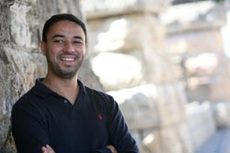
Hakim Abderrezak is an Assistant Professor in the Department of French and Italian at the University of Minnesota, Twin Cities. His research deals primarily with Maghrebi literature and cinema, and Mediterranean Studies.
His most recent publications include an article on the topic of clandestine migration in francophone Moroccan "illiterature," an interview with Algerian writer Boualem Sansal, and a book chapter on the film Il était une fois dans l'oued (Once Upon a Time in the Oued). His work has appeared in various journals, such as Sites: Contemporary French and Francophone Studies, Critical Interventions, and The Journal of North African Studies.
He co-edited a special issue of Expressions Maghrébines on Plurilingualism in the Maghreb (Winter 2012). His forthcoming book is entitled Ex-Centric Migrations: Europe and the Maghreb in Mediterranean Cinema, Literature, and Music (Indiana University Press 2014).
Labels:
Film,
French,
Home,
Literature,
Maghrebi
Special Screening: Mama Illegal
Tuesday, April 23
7:00 PM
St. Anthony Main Theatre
Cost: $10.00-$12.00
For tickets click here.
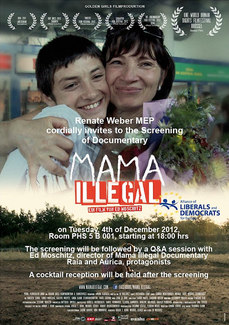
Mama Illegal is a documentary by award-winning ÖRF journalist Ed Moschitz chronicles seven years in the lives of three women.
Aurica, Raia and Natasa leave their Moldovan village--and the broken roads, the dilapidated schools and the countless abandoned houses--to work in Austria or Italy as cleaners or child care workers. Here they live a life in the underground without valid documents, without health care, and separated from their children and families for years. They send the little that remains of their hard-earned Western money home to their families.
But their desire for a brighter future and a better life comes at a high price: After all these years, their return is not what they planned. Their children are grown and their husbands estranged. The social gulf that they sought to overcome threatens to tear apart the families once and for all. Having never really arrived and been accepted in the West, they find that they have become alienated from their homeland.
The Center for Austrian Studies' BMWF Research Fellow Matthias Falter will lead a discussion after the film.
Sponsored by: Center for Austrian Studies, European Studies Consortium, Institute for Global Studies, Immigration History Research Center, MSP International Film Festival
7:00 PM
St. Anthony Main Theatre
Cost: $10.00-$12.00
For tickets click here.

Mama Illegal is a documentary by award-winning ÖRF journalist Ed Moschitz chronicles seven years in the lives of three women.
Aurica, Raia and Natasa leave their Moldovan village--and the broken roads, the dilapidated schools and the countless abandoned houses--to work in Austria or Italy as cleaners or child care workers. Here they live a life in the underground without valid documents, without health care, and separated from their children and families for years. They send the little that remains of their hard-earned Western money home to their families.
But their desire for a brighter future and a better life comes at a high price: After all these years, their return is not what they planned. Their children are grown and their husbands estranged. The social gulf that they sought to overcome threatens to tear apart the families once and for all. Having never really arrived and been accepted in the West, they find that they have become alienated from their homeland.
The Center for Austrian Studies' BMWF Research Fellow Matthias Falter will lead a discussion after the film.
Sponsored by: Center for Austrian Studies, European Studies Consortium, Institute for Global Studies, Immigration History Research Center, MSP International Film Festival
Labels:
Film,
Home,
Immigration,
Migration
Tuesday, April 2, 2013
"Resistant Pasts: The Intellectual History of Anticolonialism"
Thursday, April 11
4:00 p.m.
Room 710 Social Sciences
Dr. Berthold Molden, visiting professor at the University of New Orleans will give a special lecture on the intellectual history of global anti-colonialism.
Resistance against foreign rule is as old as human society. Within modern history, anti-colonial struggle against European domination overseas has been ubiquitous and one of the central axes of global history. In the course of decolonization, "counter histories" of marginalized groups have challenged the western canon of national and transnational master narratives. If history is relevant for politics, then anti-colonial politics of history have shaped the 20th century.
Sponsored by: Center for Austrian Studies, European Studies Consortium, Institute for Global Studies.
For more information click here.
4:00 p.m.
Room 710 Social Sciences
Dr. Berthold Molden, visiting professor at the University of New Orleans will give a special lecture on the intellectual history of global anti-colonialism.
Resistance against foreign rule is as old as human society. Within modern history, anti-colonial struggle against European domination overseas has been ubiquitous and one of the central axes of global history. In the course of decolonization, "counter histories" of marginalized groups have challenged the western canon of national and transnational master narratives. If history is relevant for politics, then anti-colonial politics of history have shaped the 20th century.
Sponsored by: Center for Austrian Studies, European Studies Consortium, Institute for Global Studies.
For more information click here.
Labels:
Colonialism,
History,
Home
Burning the Sea: Clandestine Migration in the Age of Globalization Symposium
Burning the Sea: Clandestine Migration in the Age of Globalization
Symposium
Friday and Saturday, April 19-20, 2013
Nolte Center
Rooms 140 &125
Friday, April 19, 9:00-5:00
Saturday, April 20, 10:00-2:30
Free and open to the public. Reservations required, to reserve please click here.
 Accounts of North- and Sub-Saharan African clandestine migrations to Europe are broadcast widely in print and electronic media. Concurrently, fictional accounts on the matter published in French, Spanish, and Italian have grown considerably. Though they have received extensive media coverage, the desperate crossings have garnered little academic attention.
Accounts of North- and Sub-Saharan African clandestine migrations to Europe are broadcast widely in print and electronic media. Concurrently, fictional accounts on the matter published in French, Spanish, and Italian have grown considerably. Though they have received extensive media coverage, the desperate crossings have garnered little academic attention."Burning the Sea: Clandestine Migrations in the Age of Globalization" is a symposium designed as an interdisciplinary conference that will bring together fifteen scholars from various national and international institutions, with a wide range of disciplines in the humanities and social sciences. Panelists will discuss contemporary clandestine human migratory flows across the Mediterranean Sea between southwestern Europe and North- and Sub-Saharan Africa, as they are represented in French, Francophone, and Spanish literature and cinema. Panels will also examine these migratory patterns, concentrating on how they are accounted throughout history, in mass media, and political discourse.
Sponsored by: University of Minnesota Imagine Fund Special Events Programs,
European Studies Consortium, Institute for Global Studies, Immigration History Research Center, Interdisciplinary Center for the Study of Global Change, Department of French and Italian, Institute for Advanced Studies, Department of Spanish and Portuguese, Department of History, Humphrey School of Public Affairs.
Painting: Burning the Sea (2013) Jordan Kammer
Center for Holocaust & Genocide Studies announces a symposium on genocide
Representing Genocide: Media, Law and Scholarship
April 5 & 6, 2013
Place TBD

The symposium will address journalistic, judicial and social scientific depictions of atrocities with a focus on cases of the Holocaust, Darfur, and Rwanda. It seeks to explore the intersections between these different discursive fields and case studies to shed light on the increasing tension between the local and global representations and memories of mass murder.
The particular ways in which current genocides are represented have critical consequences for the responses and interventions offered by the rest of the world. This has been evident in both Darfur and Rwanda, where the framing of the events and the labels and definitions used by the media and scholarship to describe them (such as "tribal violence") had a detachment effect and did not favor any sort of intervention to halt the atrocities. Reversely, references to the Holocaust in the representation of contemporary mass atrocities--so-called "metaphorical bridging"--can also crucially impact the process of intervention, as the case of Bosnia has demonstrated.
Few attempts have been made to specifically highlight the connection between representations of past mass atrocities and their actual impact on unfolding events of mass violence. An examination of this urgent question is an essential component of global progress towards human rights goals and the prevention or reduction of future political violence. Moreover, while there is an important body of work on Holocaust memory as such, the symposium will explore when and how promoting public awareness and memory of mass atrocities through distinct institutions (the media, the judiciary and academic scholarship) can lead to effective anti-genocide policies.
For complete listing of participating scholars and sponsors please click here to visit the CHGS web page on the symposium.
April 5 & 6, 2013
Place TBD

The symposium will address journalistic, judicial and social scientific depictions of atrocities with a focus on cases of the Holocaust, Darfur, and Rwanda. It seeks to explore the intersections between these different discursive fields and case studies to shed light on the increasing tension between the local and global representations and memories of mass murder.
The particular ways in which current genocides are represented have critical consequences for the responses and interventions offered by the rest of the world. This has been evident in both Darfur and Rwanda, where the framing of the events and the labels and definitions used by the media and scholarship to describe them (such as "tribal violence") had a detachment effect and did not favor any sort of intervention to halt the atrocities. Reversely, references to the Holocaust in the representation of contemporary mass atrocities--so-called "metaphorical bridging"--can also crucially impact the process of intervention, as the case of Bosnia has demonstrated.
Few attempts have been made to specifically highlight the connection between representations of past mass atrocities and their actual impact on unfolding events of mass violence. An examination of this urgent question is an essential component of global progress towards human rights goals and the prevention or reduction of future political violence. Moreover, while there is an important body of work on Holocaust memory as such, the symposium will explore when and how promoting public awareness and memory of mass atrocities through distinct institutions (the media, the judiciary and academic scholarship) can lead to effective anti-genocide policies.
For complete listing of participating scholars and sponsors please click here to visit the CHGS web page on the symposium.
Labels:
"Law and Scholarship",
"The Holocaust",
CHGS,
Darfur,
genocide,
Home,
Media,
Rwanda
Friday, March 15, 2013
The Great Eurozone Disaster: From Crisis to Global New Deal
A lecture by Heikki Patomäki
Friday, March 29, 2013
1:00 p.m.
Room 614 Social Sciences
Refreshments served
The historical development and functioning of global financial system,
the 2008-2009 crisis, and the European debt crisis that started in 2010 have been tightly intertwined. The Euro crisis is, in essence, a second phase of the epic recession that began in 2008. Moreover, the ideological underpinnings or inherent contradictions of the European Monetary Union (EMU) are not specific to the EMU only. Similar ambiguities and imbalances characterize also the dynamics of global political economy as a whole.
In his lecture, Professor Patomäki argues first that the Euro crisis requires
reforms in the systems of global governance; and second that this
conclusion should be generalized from a non-Eurocentric perspective,
presupposing also a new global imaginary of ethics and politics.
Heikki Patomäki is Professor of World Politics at the University of Helsinki, Finland and a founding member of NIGD (Network Institute for Global Democratization) He is also an activist in the international ATTAC (Association for the Taxation of financial Transactions and Aid to Citizens) movement and currently chairing ATTAC Finland.
His research interests include philosophy and methodology of social sciences, peace research, futures studies, economic theory, global political economy, and global political theory.
His most recent book is The Great Eurozone Disaster: From Crisis to Global New Deal (Zedbooks, March 2013).
Sponsored by The Government of Finland/David and Nancy Speer Visiting Professorship, European Studies Consortium, Department of Political Science, Institute for Global Studies.
Friday, March 29, 2013
1:00 p.m.
Room 614 Social Sciences
Refreshments served
The historical development and functioning of global financial system,
the 2008-2009 crisis, and the European debt crisis that started in 2010 have been tightly intertwined. The Euro crisis is, in essence, a second phase of the epic recession that began in 2008. Moreover, the ideological underpinnings or inherent contradictions of the European Monetary Union (EMU) are not specific to the EMU only. Similar ambiguities and imbalances characterize also the dynamics of global political economy as a whole.
In his lecture, Professor Patomäki argues first that the Euro crisis requires
reforms in the systems of global governance; and second that this
conclusion should be generalized from a non-Eurocentric perspective,
presupposing also a new global imaginary of ethics and politics.
Heikki Patomäki is Professor of World Politics at the University of Helsinki, Finland and a founding member of NIGD (Network Institute for Global Democratization) He is also an activist in the international ATTAC (Association for the Taxation of financial Transactions and Aid to Citizens) movement and currently chairing ATTAC Finland.
His research interests include philosophy and methodology of social sciences, peace research, futures studies, economic theory, global political economy, and global political theory.
His most recent book is The Great Eurozone Disaster: From Crisis to Global New Deal (Zedbooks, March 2013).
Sponsored by The Government of Finland/David and Nancy Speer Visiting Professorship, European Studies Consortium, Department of Political Science, Institute for Global Studies.
Tuesday, March 5, 2013
Special Film Screening "About a Village: Children of the High Woods"
Screening and discussion with director John Swanson, professor, department of History, University of Tennessee at Chattanooga
Tuesday, March 12
7:00 PM
Room 710 Social Sciences Building
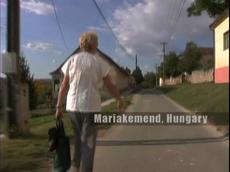
The Center for Austrian Studies will host producer, writer and director John Swanson, whose film About a Village: Children of the High Woods, examines the meaning of home.
Where is one's true home? For Elsa Koch and her circle of friends this question is more complicated than for most of us. Born in a German-speaking village in southern Hungary, they were forced to leave after the Second World War, still children. Although they eventually succeeded in building their lives in post-war Germany, the transition was not easy. Having been expelled from Hungary as Germans--a measure sanctioned by the Allies in 1945--they were regarded as outsiders in Germany as well, often referred to as 'Hungarian Gypsies.'
They had to suddenly become adults when they did not yet feel ready for it. No wonder that the small Hungarian village keeps occupying a special place in their hearts. They yearn for the uncomplicated world of their childhoods, where their lives were mapped out by the village streets and nothing could penetrate their sphere of joy and playfulness, not even the cruelties of war and politics. Is that world gone forever or have they managed to hold onto it throughout the past six decades? Is it in fact a physical place or more of an inner landscape?
About a Village: Trailer
Sponsored by: Austrian Studies, European Studies Consortium, Institute for Global Studies, Immigration History Research Center.
Tuesday, March 12
7:00 PM
Room 710 Social Sciences Building

The Center for Austrian Studies will host producer, writer and director John Swanson, whose film About a Village: Children of the High Woods, examines the meaning of home.
Where is one's true home? For Elsa Koch and her circle of friends this question is more complicated than for most of us. Born in a German-speaking village in southern Hungary, they were forced to leave after the Second World War, still children. Although they eventually succeeded in building their lives in post-war Germany, the transition was not easy. Having been expelled from Hungary as Germans--a measure sanctioned by the Allies in 1945--they were regarded as outsiders in Germany as well, often referred to as 'Hungarian Gypsies.'
They had to suddenly become adults when they did not yet feel ready for it. No wonder that the small Hungarian village keeps occupying a special place in their hearts. They yearn for the uncomplicated world of their childhoods, where their lives were mapped out by the village streets and nothing could penetrate their sphere of joy and playfulness, not even the cruelties of war and politics. Is that world gone forever or have they managed to hold onto it throughout the past six decades? Is it in fact a physical place or more of an inner landscape?
About a Village: Trailer
Sponsored by: Austrian Studies, European Studies Consortium, Institute for Global Studies, Immigration History Research Center.
Call for Applications Badzin Graduate Fellowship in Holocaust and Genocide Studies
The Center for Holocaust and Genocide Studies and the Department of History, University of Minnesota Announce a Call for Applicants for the Bernard and Fern Badzin Graduate Fellowship in Holocaust and Genocide Studies.
The Fellowship is for the 2013-2014 academic year.
The Badzin Fellowship will pay a living stipend of $18,000, and the cost of tuition, mandatory fees and health insurance.
Eligibility: An applicant must be a current student in a Ph.D. program in the College of Liberal Arts, currently enrolled in the first, second, third, or fourth year of study, and have a doctoral dissertation project in Holocaust and genocide studies. The fellowship will be awarded on the basis of the quality and scholarly potential of the dissertation project, the applicant's quality of performance in the graduate program, and the applicant's general scholarly promise.
Required application materials:
1) A letter of application (maximum 4 pages single-spaced) describing the applicant's intellectual interests and dissertation research and the research and/or writing which the applicant expects to do during the fellowship year
2) A current curriculum vitae for the applicant
3) An unofficial transcript of all graduate work done at the University of Minnesota
4) TWO confidential letters of recommendation from U of MN faculty, discussing the quality of the applicant's graduate work and dissertation project and the applicant's progress toward completing the degree, sent directly to the Center for Holocaust and Genocide Studies (chgs.umn.edu).
All application materials must be received by the Center for Holocaust and Genocide Studies electronically chgs.umn.edu, no later than 3:00 pm on Friday, March 15, 2013.
The awardee will be announced no later than Friday, April 26, 2013.
The Fellowship is for the 2013-2014 academic year.
The Badzin Fellowship will pay a living stipend of $18,000, and the cost of tuition, mandatory fees and health insurance.
Eligibility: An applicant must be a current student in a Ph.D. program in the College of Liberal Arts, currently enrolled in the first, second, third, or fourth year of study, and have a doctoral dissertation project in Holocaust and genocide studies. The fellowship will be awarded on the basis of the quality and scholarly potential of the dissertation project, the applicant's quality of performance in the graduate program, and the applicant's general scholarly promise.
Required application materials:
1) A letter of application (maximum 4 pages single-spaced) describing the applicant's intellectual interests and dissertation research and the research and/or writing which the applicant expects to do during the fellowship year
2) A current curriculum vitae for the applicant
3) An unofficial transcript of all graduate work done at the University of Minnesota
4) TWO confidential letters of recommendation from U of MN faculty, discussing the quality of the applicant's graduate work and dissertation project and the applicant's progress toward completing the degree, sent directly to the Center for Holocaust and Genocide Studies (chgs.umn.edu).
All application materials must be received by the Center for Holocaust and Genocide Studies electronically chgs.umn.edu, no later than 3:00 pm on Friday, March 15, 2013.
The awardee will be announced no later than Friday, April 26, 2013.
Tuesday, February 5, 2013
Deadline for 2013-2014 in European and International Studies is February 15, 2013.
The Institute for Global Studies of the University of Minnesota is accepting nominations for the 2013-2014 Fellowship in European and International Studies, Foreign Language and Area Studies (FLAS).
The competition is open to undergraduate, graduate and professional students to promote the study of modern foreign languages and in particular less-commonly-taught languages in European and International studies.
Summer Fellowships provide $2500 living stipend and $5000 towards tuitions and fees for undergrads, graduate and professional students. Academic Fellowships provide undergraduates with a $5000 living stipend and $10,000 towards tuition and fees. A $15,000 living stipend and $18,000 towards tuition and fees is available for graduate and professional students.
The deadline for applications is February 15, 2013 by 4:30 p.m. Eligibility, complete details and nomination forms for both the international and European competitions are available by clicking here.
Informational meetings are scheduled for Monday, November 12 from 12-1 p.m. in room 18 Follwell Hall, Friday, November 16 from 12-1 p.m. in room 60 Humphrey Center (emphasis on professional students), Wednesday, November 28 from 10-11 a.m. in room 614 Social Sciences (emphasis on graduate students), and Thursday, November 29 from 10-11 a.m. in room 35 Nicholson Hall (emphasis on undergraduate students). The meetings will provide students information on eligibility, priorities and strategies for successful applications. Refreshments will be served and interested applicants are welcome to all meetings times.
The competition is open to undergraduate, graduate and professional students to promote the study of modern foreign languages and in particular less-commonly-taught languages in European and International studies.
Summer Fellowships provide $2500 living stipend and $5000 towards tuitions and fees for undergrads, graduate and professional students. Academic Fellowships provide undergraduates with a $5000 living stipend and $10,000 towards tuition and fees. A $15,000 living stipend and $18,000 towards tuition and fees is available for graduate and professional students.
The deadline for applications is February 15, 2013 by 4:30 p.m. Eligibility, complete details and nomination forms for both the international and European competitions are available by clicking here.
Informational meetings are scheduled for Monday, November 12 from 12-1 p.m. in room 18 Follwell Hall, Friday, November 16 from 12-1 p.m. in room 60 Humphrey Center (emphasis on professional students), Wednesday, November 28 from 10-11 a.m. in room 614 Social Sciences (emphasis on graduate students), and Thursday, November 29 from 10-11 a.m. in room 35 Nicholson Hall (emphasis on undergraduate students). The meetings will provide students information on eligibility, priorities and strategies for successful applications. Refreshments will be served and interested applicants are welcome to all meetings times.
Labels:
"Foreign Languages",
Awards,
Fellowships,
FLAS,
Home
Candidates for Director of Center for Austrian Studies to Present
Candidates for Director of CAS
Center for Austrian Studies is conducting a search for a new director and has invited four finalists to campus. Each candidate will give a presentation on their current research and a talk outlining their vision for the future of the Center. Dates, times, and locations are listed on the CAS website.
All members of the university community and the public are welcome.
Center for Austrian Studies is conducting a search for a new director and has invited four finalists to campus. Each candidate will give a presentation on their current research and a talk outlining their vision for the future of the Center. Dates, times, and locations are listed on the CAS website.
All members of the university community and the public are welcome.
Labels:
"Center for Austrian Studies",
Austria,
Home
Subscribe to:
Posts (Atom)
© Regents of the University of Minnesota. All rights reserved. Equal opportunity educator and employer.